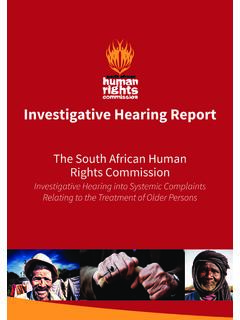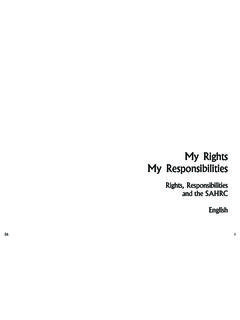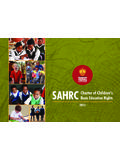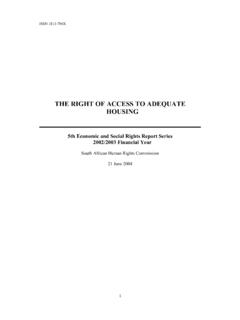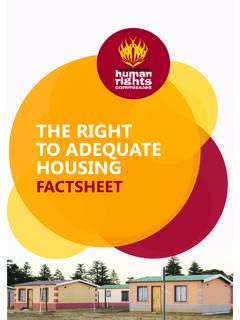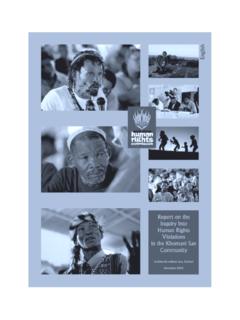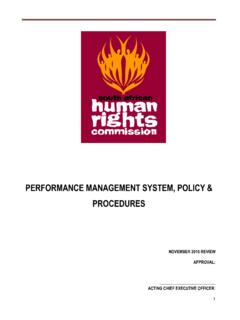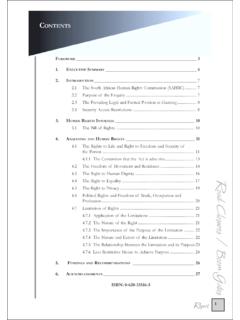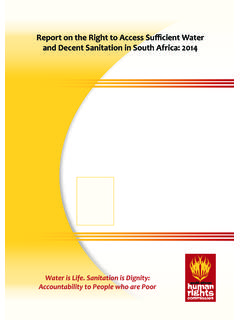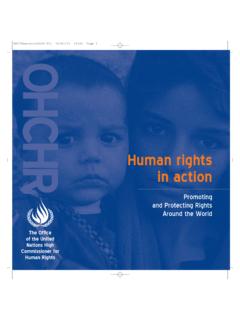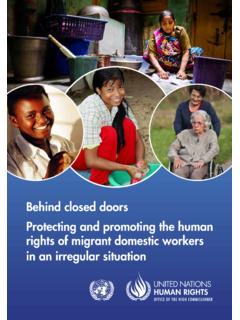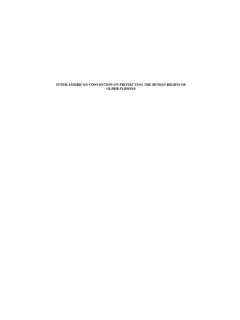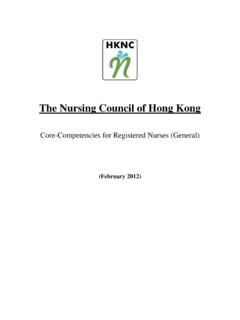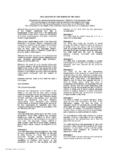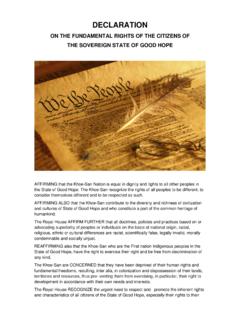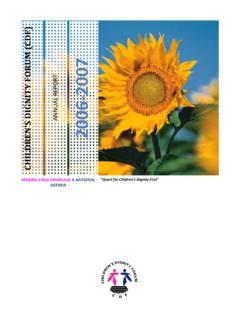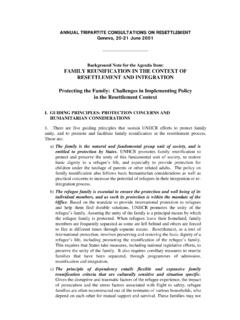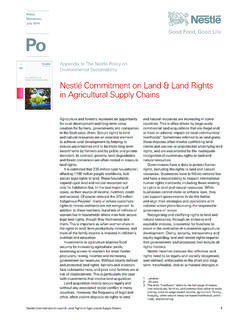Transcription of Reflections on Democracy and Human Rights - SAHRC
1 Reflections on DemocracyandHuman Rights :A Decade of theSouth African Constitution(Act 108 of 1996)South African Human Rights CommissionHuman Rights House29 Princess of Wales Terrace, corner York & St Andrews StsParktownJohannesburgPrivate Bag South African Human Rights Commission 2006 First published in South Africa in 2006 ISBN 0-620-36364-9 All Rights reserved. No part of this publication may be reproduced,stored in a retrieval system or transmitted in any form or by any means,electronic, mechanical, photocopying, recording or otherwise,without the express permission, in writing of the editing and project management by Wordsmiths Publishing , printed and bound by Creda Communications,Cape Town, South AfricaForewordOn the occasion of the tenth anniversary of our Con-stitution, there can be little argument that the humanrights values underpinning our democratic dispensa-tion become increasingly entrenched with the passageof time.
2 The language and message of Human rightsdefine critical processes such as law and policy-mak-ing; the relationship between citizens and the state; andthe relationships among and between citizens and, inmany instances, non-citizens. Notwithstanding the factthat they are most often contested, and that differinginterpretations of Human Rights widely exist, more andmore of our people have come to rely on and asserttheir Rights . This can only be healthy for our , it is also important that as people assert andclaim their Rights , they accept the responsibilities thatcome with having South African Human Rights Commission is oneof the institutions with the responsibility of ensuring thathuman Rights remain at the centre of debate anddialogue in the nation; that the lofty provisions in the Billof Rights are translated into reality for the many whoneed their protection; and that equality and humandignity are more than legal concepts.
3 Values that areinternalised and reflected in our relations with essential part of celebrating our significantachievements as a nation is reflecting seriously on howwe have gone about discharging the Constitutionalcontract, and, in particular, how we have collectivelyused the vision of the Constitution as a central vehiclein the transformation of our publication seeks to make a contribution in thatprocess of reflection and assessment. Through thevarious contributions, we seek to present an overviewof the progress made on various fronts and sectors, theinterventions that have worked, the unfinished busi-ness, and challenges for the all of this we must remain mindful that, even withall that we have achieved, there remain considerabledeficits in overcoming the legacy of discrimination andthe grinding effects of poverty.
4 The evidence of thisconfronts us with frequent regularity, and the challengewe face is to ensure that the promise of the Constitutionis made good and realised in substantial terms by allour would like to thank all who have contributed tothis publication, including the various contributors andthe Commissioners and staff of the Human KollapenChairpersonSouth African Human Rights CommissionContentsChapter One:South Africa 1994 Two:Promoting Equality through Administrative Three:Protecting the Right to Equality through the Constitutional Four:The Challenge of Employment and Equity in the Five:Socio-Economic Rights and the Distribution of Basic Eleven:Social Security and Social Thirteen:The Right to Development: An Implied Right in South Africa s Constitutional Fourteen:Environmental Fifteen:The Criminal Justice Sixteen:Political Seventeen:Freedom of Eighteen:The Right of Access to Information at Age Nineteen:Cultural, Religious and Linguistic South African Human Rights Commission herewithexpresses its appreciation to the contributors for writingthe various chapters.
5 Our thanks also go to ProfessorNasila Rembe for the overall editing of the publicationand for writing the foreword and views expressed in this publication are those of theindividual contributors and do not necessarily reflect theviews of the South African Human Rights 2004 South Africa celebrated ten years of democ-racy. This year heralds yet another milestone in thehistory of South Africa commemoration of ten yearsof the Constitution. The Constitution of South Africa,1996, has, since its adoption, provided the legal frame-work upon which the new social and political order isfounded. It lays down the principles of democraticgovernance; and establishes and defines the powersand functions of governmental institutions, and thevalues that underpin the new Democracy . The Consti-tution has been the yardstick to measure, and beaconto guide, conduct in private life and public administra-tion, and the civility of governance in general.
6 It hasprovided the compass that has steadily steered SouthAfrica as a nation away from the dark days of apartheidto a future that is founded on freedom, respect forhuman Rights and the rule of law, and in which there ishope for even greater realisation of social justice andprosperity for all South papers presented in this Review are a modestcontribution to the commemoration of ten years of theSouth African Constitution. The South African HumanRights Commission provided the resources and spacein which different contributors reflect on various keyareas of Democracy and constitutional development inSouth Africa over the past decade, the achievementsthat have been made, the challenges that were en-countered in the process, and the lessons that can belearned. The views expressed in this Review are there-fore not those of the South African Human RightsCommission or necessarily shared by the to say, they are a pointer to a growing andmaturing Democracy , vibrant in ideas, some contestedand at times critical of our government and , the contributions to this Review were writtenwith the commemoration of a decade of South Africa sdemocracy, 1994-2004, in mind.
7 For reasons that neednot be explained here, this effort stalled. However, theideas expressed by the different contributors, thoughtwo years old, still remain extant and resonate well withthe commemoration of ten years of the would like to thank individually and collectively allthose who contributed to this task of conceiving and refining the idea, theconvening of different contributors, planning, co-ordinating and facilitating the process involved exper-tise and assistance beyond the South African HumanRights Commission. We would therefore like to thankall those who served as members of the , and the Constitution need to be under-stood, nurtured and made to grow, so that their ideals,for which we have struggled for so long, can betranslated into our daily lives. It is therefore our sincerehope that this contribution will generate interest amongthe government and its administration; relevant institu-tions of government and civil society formations; andacademia on and beyond the areas discussed and theissues raised by the contributors.
8 We have, and mustshare, a collective responsibility in ensuring that ouryoung Democracy works, and that South Africaemerges as a stable, peaceful and prosperous society,and always remains a winning Nasila RembeEditorMarch 2006 Chapter OneSouth Africa 1994 2004Dr Chris Landsberg & Shaun Mackay1. IntroductionThis chapter has two areas of focus. Thefirst pro-vides an overview of the historical context of humanrights in the pre- Democracy era by giving an account ofthe struggle for liberation, the Human Rights deficit andinequalities caused by apartheid, as well as a back-ground audit of what South Africa inherited in it has not always been possible, this chapterattempts to move along timelines in the developmentof, and thefight against, second area of focus looks at the nature of thepost-apartheid state, the challenges of transformation,the changing nature of civil society, and South Africa srole in the world.
9 It looks specifically at the achieve-ments and challenges of the post-apartheid period. Theperiod from 1994 to 1999 can be characterised as Transition to Democracy , during which Nelson Man-dela held the presidency. The Mandela governmentemphasised policy-making, nation building and recon-ciliation. It abolished a litany of discriminatory apartheidlegislation, which diminished the citizenship Rights ofblacks and reduced them to second-class citizens intheir own country. This period had a largely inward-looking second period is dubbed Stabilising Democ-racy , and it stretches from 1999 to the present. The eraof the Mbeki presidency placed an emphasis on deliv-ery, including widespread extension of essential ser-vices, the transformation of society, the economic em-powerment of blacks, and the political, economic andcultural revival of Africa, or the African Renaissance.
10 2. Historical Context of Human Rights inthe The Essence of ApartheidApartheid is synonymous with the gross violation ofhuman Rights . Between 1948 and 1989, South Africagradually became one of the most oppressive andrepressive regimes; in turn it became one of the mostisolated pariah states because of this inhuman apartheid state made Human Rights violations anart form. During this period, South Africa consolidatedone of the most racist states, basing itsraison d treonthe apartheid system and doctrine of political, socialand economic participation and exclusion of its citi-zenry according to crude racial criteria. This socialengineering of apartheid secured a virtual monopoly ofpolitical and economic power for whites. South Africawas a racistocracy,1albinocracy and Declaration of Human Rights , whichwas adopted by the General Assembly on 10 Decem-ber 1948, the same year that apartheid was formallyadopted, was, at the very least, politically, if not legallybinding on states.
